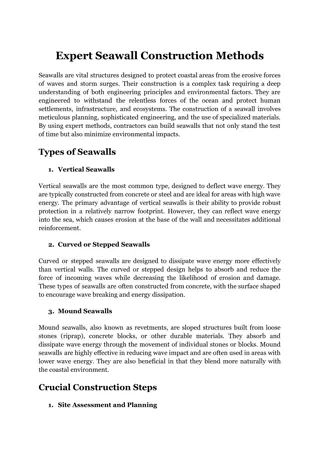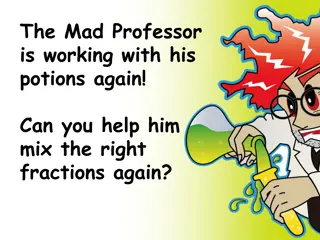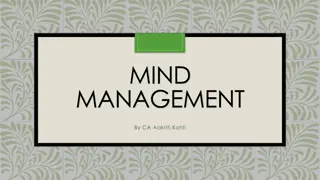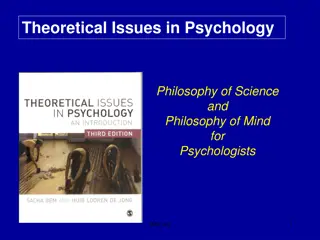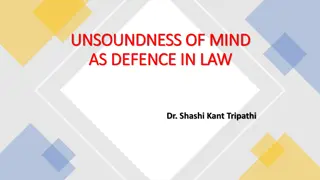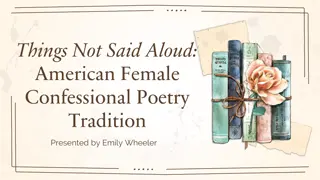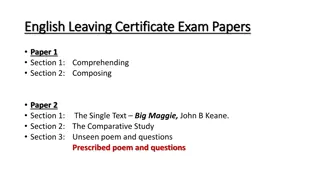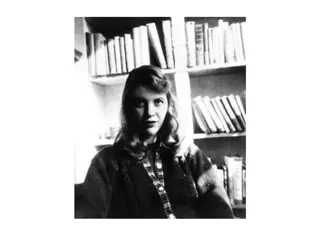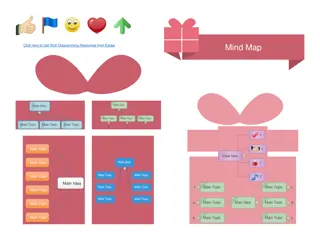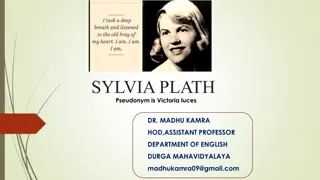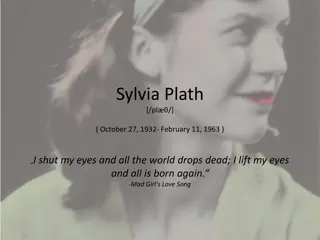Sylvia Plath: Excavating the Mind and Madness
Delve into the life and struggles of Sylvia Plath, a brilliant poet who grappled with inner turmoil and psychological complexities. Explore the roots of her despair, from personal struggles in a fairy-tale-like life to societal expectations and her complex relationship with her father. Through her works like "Daddy," Plath reveals layers of narcissistic fixation, megalomania, and a deep-seated longing for paternal love. Unravel the mind of a poetic genius haunted by madness and inner demons.
Download Presentation

Please find below an Image/Link to download the presentation.
The content on the website is provided AS IS for your information and personal use only. It may not be sold, licensed, or shared on other websites without obtaining consent from the author.If you encounter any issues during the download, it is possible that the publisher has removed the file from their server.
You are allowed to download the files provided on this website for personal or commercial use, subject to the condition that they are used lawfully. All files are the property of their respective owners.
The content on the website is provided AS IS for your information and personal use only. It may not be sold, licensed, or shared on other websites without obtaining consent from the author.
E N D
Presentation Transcript
SYLVIA PLATH: EXCAVATING THE MIND AND MADNESS: AN EVALUATION OF LIFE AND DADDY Sahidur Rahaman Lasker Asst. Professor in English, Vidyanagar College, University of Calcutta, Email: sahid.jones7@gmail.com, Contact: 9046232226.
PLATH AND HER FAIRY-TALE LIFE She lived an outwardly exemplary life with bright scholarship, graduating first in her class at Smith College. Wins a fulbright scholarship to study at Cambridge University She met her charismatic husband-to-be poet Ted Hughes , with whom she had two children and settled in a country house in England.
WHERE LIES THE ROOT OF DESPAIR AND MADNESS On can categorize two niches to talk about the reasons behind the poet s angst: Personal problems resulting from her would-have been fairy-tale life, estrangement from her husband Repressive 1950s attitudes towards women, venting anger and raising movements against the straitjacketed roles o women
DELVING DEEP INTO THE CAUSES Narscissistic Fixation and Megalomania of Sylvia lath : I do not love; I do not love anybody except myself. This is rather a shocking thing to admit . I am capable of affection of those who reflect my own world She always felt the existential brag at her heart : I am, I am, I am
I LOVE MY FATHER , I HATE MY FATHER Sylvia Plath admits that the person she loved most was her father All other males appear to her as surrogates. She measured people in terms of her father and the resultant ennui and failure leads her to despair and anxiety.
DADDY, DADDY, YOU BASTARD In her Journals Plath unknots her intense love for her father, who only departs her at her childhood. She deifies her father and hates him This reinforced her to create Daddy Sylvia Plath uncorks: The poem Daddy is spoken by a girl with an Electra Complex. Her father died only when she thought he was a God. His death at her childhood escalates her feelings of abandonment, causing her subsequent hatred to all men.
BIOGRAPHICAL NOTES IN NUTSHELL Born in Boston, Sylvia Plath became a respected novelist, short-story writer and poet during her brief lifetime (1932-1963). Plath married poet Ted Hughes in 1956 with whom she had two children and travelled between America and England. The young poet suffered greatly from depression, anxiety and madness which is reflected in her work and in 1963 she committed suicide.
ANTI- TRADITION AND THE IMPETUS A shift from the traditional forms, ideas , history can provide meaning and continuity. It encourages a break-through from the contemporary system. WWII and the events produced a sense of history as discontinuous. The protest movements of the 1960s The rise of anonimity and consumerisation Rise of mass media and mass culture Reading poetry became more relevant than before. It offered people a fresh window to express subjective life . cont .
ANTI- TRADITION AND THE IMPETUS An emergence of the Idiosyncratic poets to decentralize the Contemporary Generation of innovative techniques in creative unique voices.
ALIENATION AND LONELINESS ALL MY LIFE I HAVE STOOD UP EMOTIONALLY BY THE PEOPLE I LOVED MOST; DADDY DYING AND LEAVING ME, MOTHER SOMEHOW NOT THERE
YOU CANNOT SEPARATE ME FROM MY POETRY Plath s poetry is a metaphor of absurdity of life Her poetry is a self-deprecatory laughter and a solution for perpetuated pain and nubmness
DICHOTOMOUS INTERFACE: Destructive forces of life Creative forces of life
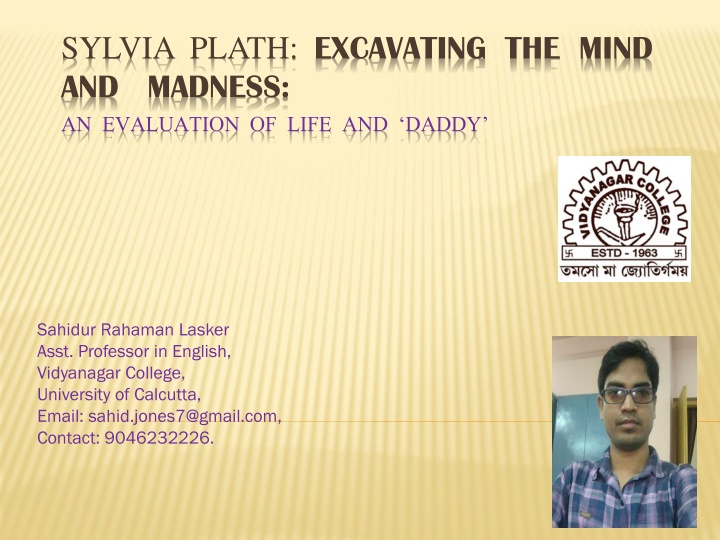

![[PDF⚡READ❤ONLINE] Zen Mind, Beginner's Mind: 50th Anniversary Edition](/thumb/20459/pdf-read-online-zen-mind-beginner-s-mind-50th-anniversary-edition.jpg)

